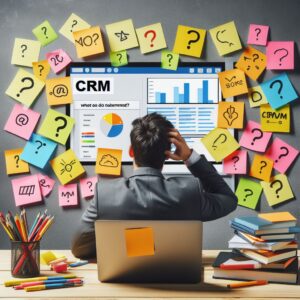What Is a CRM

As a small business owner, you may have a hard time building closer relationships with customers.
What Is a CRM?. This sentiment is quite common among entrepreneurs and becomes even more pervasive as your business grows.
Once you have created a website and developed your marketing strategy, you will find that an increasing number of people are interested in your products or services.
Suddenly, you are faced with such a wide range of customers that you can no longer track them with a simple spreadsheet or mailing list, let alone their names.
This is where the CRM comes into play.
Specifically designed to help you manage and understand your customers, these digital tools help you attract and retain customers while supporting the growth of your business.
In this article, you will learn what a CRM is, what its benefits are, and which type of CRM tool is best for your business.
What is CRM and how does it work?
CRM stands for Customer Relationship Management.
Traditionally, this refers to a customer relationship management approach that uses analysis of customer preferences and behavioral data to provide more detailed information about buyers and prospects.
However, with the spread of this approach, the acronym CRM has come to refer not only to the method, but also to the digital tools and software used to implement it.
A CRM is an essential marketing resource for small businesses.
It stores data on current and potential customers, analyzes past interactions with customers and facilitates communication between customers and company representatives.
The use of this digital tool is important for many reasons.
For one thing, customer information tends to be everywhere: scattered across social media platforms, buried in a customer service rep’s inbox, archived as a mental note from a salesperson – the list is long.
When this information is not consolidated, it is difficult to gain a clear understanding of your customers and develop a marketing strategy that accurately reflects their needs.
CRMs solve this problem by pulling data from various marketing resources, including a company’s website, social media platforms, and email marketing system, and putting everything in one place.
They also help businesses use this data by providing features like chat tools, marketing automation, and contact management.
In this way, CRMs allow companies to easily follow their leads and potential customers throughout their marketing journey, from the first point of contact to the sale.
Why do you need a CRM?
Customer relationship management is one of the biggest marketing trends today.
Whether you’ve just started your business or have been in business for a while, you’ll know it’s time to adopt a CRM if:
1.- You find it difficult to visualize the relationship between customer analytics data across your different platforms.
2.- You find it boring to navigate between different platforms and spreadsheets to get an overview of your customers.
3.- Your marketing and sales teams are not aligned in their targeting strategy and are slowed down by redundant activities.
4.- You have trouble retaining your customers or too many potential customers fail to convert.
While you can start managing your customers with a simple spreadsheet or email marketing tool, it becomes difficult to keep that data organized and consistent as you gain new customers.
By creating a systematic and easy-to-use recording of customer data using integrated digital tools, a CRM system helps brands resonate more strongly with their target market.
Advantages of using a CRM system
You can think of a CRM system as an all-in-one customer management solution that helps you generate leads as you interact with your existing customer base.
The benefits of implementing a CRM include:
Improved analysis. The sheer amount of data that companies amass about their potential and existing customers is simply too large to be processed by the human mind alone.
CRM data analysis tools not only consolidate this information, but also classify it to make it more readable and digestible for employees.
A deeper understanding of customers.
A customer relationship management system aggregates information about your contacts and customers, storing information from separate sources in one place.
This helps you create a targeted marketing strategy that addresses your customers’ pain points and aligns with their wishes.
Improved customer service
By consolidating and sorting data, CRM systems also improve your interactions with customers, improving the online reputation of your business.
When interacting with sales and service reps, customers won’t need to repeat their story over and over because employees will already be up to date on their status and purchase history.
As a result, you will be able to address any customer concerns immediately, increasing customer satisfaction and loyalty.
Increase in sales
In addition to organizing customer data, a CRM system synchronizes that information with digital tools such as email, chat and social media.
As a result, marketing and sales teams will be better aligned and able to meet customer needs depending on where they are in the sales pipeline.
CRM tools drive conversions by simplifying the sales process to guide customers to purchase.
Greater customer loyalty
While customer acquisition is critical to business success, customer retention can be even more so.
In fact, studies have shown that increasing customer retention by 5% can lead to a 25% to 95% increase in profits.
By improving customer communication and enabling service teams to meet their needs faster and more effectively, CRMs can help businesses build a loyal customer base.
Optimized workflow
Customer relationship management tools improve the efficiency of business operations by automating tasks such as cart abandonment emails and confirmation messages.
This reduces repetitive work and allows sales and marketing teams to focus on more strategic activities.
Better internal communication
CRM systems facilitate collaboration between team members, reducing wasted time such as communication problems and redundant activities.
In this way, they improve time management, improve productivity and allow for easier project management.
Types of CRM systems
Now that you know the benefits of using a CRM, you’re probably curious about which type is best for your business.
CRM tools can be roughly classified into three main types: operational, analytical and collaborative.
While each performs similar tasks, it has its own unique characteristics and benefits:
Operational CRM
An operational CRM uses marketing automation, sales automation, and service automation to optimize business processes.
Its main purpose is to perform tasks that might otherwise take a great deal of time.
These include compiling important marketing analytics, sending automated messages, and tracking sales and other customer behaviors.
Ascend from Wix is an effective solution for small businesses that incorporates these features into your website.
Since Wix’s marketing tools can integrate with your professional site, they are useful for managing customers, driving web traffic, and growing your customer base.
Analytical CRM
They are useful tools for analyzing data such as customer preferences, contact information, and more.
Specifically, they enable companies to perform complex analytics across multiple datasets, combining factors such as customer location and website behavior, to better identify buying patterns and trends.
With a large database and data mining capabilities, this type of CRM is particularly useful for analysts who need a close view of customer characteristics and behavior.
Collaborative CRM
Like other types of customer relationship management systems, collaborative CRMs help companies collect and classify customer data in order to improve customer management.
However, its structure is specifically designed to improve synchronization between multiple teams.
This type of CRM software freely shares customer information throughout the organization, increasing transparency and productivity in the workplace.
It also helps teams identify which communication channels best suit the preferences of certain types of customers, whether it’s email, live chat, or social media marketing.

